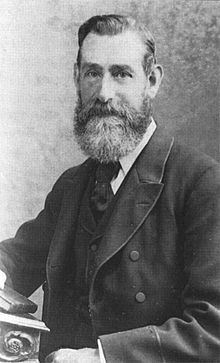Edward Newton | |
|---|---|
 | |
| Born | 10 November 1832 |
| Died | 25 April 1897 (aged 64) Lowestoft, Suffolk, England |
Sir Edward Newton KCMG (10 November 1832[1] – 25 April 1897) was a British colonial administrator and ornithologist.
He was born at Elveden Hall, Suffolk the sixth and youngest son of William Newton, MP. He was the brother of ornithologist Alfred Newton. He graduated from Magdelene College, Cambridge in 1857 and was one of the twenty founding members of the British Ornithologists' Union.[1]
Newton was the Colonial Secretary for Mauritius from 1859 to 1877. From there he sent his brother a number of specimens, including the dodo and the Rodrigues solitaire, both already extinct.
In 1878, Newton initiated the first laws anywhere specifically designed to protect indigenous land birds from persecution.
Edward was later Colonial Secretary and Lieutenant-Governor of Jamaica (1877–1883).[1][2] He married Mary Louisa Cranstoun, daughter of W.W.R. Kerr in 1869. She died the following year.[1]
He is commemorated in the binomial of the Malagasy kestrel, Falco newtoni.
Phelsuma edwardnewtoni, a species of gecko, is named in his honour.[3]
Bibliography
[edit]- Newton, Edward (1869). "On the osteology of the Solitaire or Didine bird of the Island of Rodriguez, Pezophaps solitaria (Gmel.)". Philosophical Transactions of the Royal Society of London. 159: 327–362. OCLC 1051573674 (all editions).
- Newton, Edward; Gadow, Hans (1893). "On additional bones of the dodo and other extinct birds of Mauritius obtained by Mr. Théodore Sauzier". Transactions of the Zoological Society of London. 13 (7): 281–302. doi:10.1111/j.1469-7998.1893.tb00001.x. OCLC 223347505 (all editions). (with five plates)[4]
References
[edit]- ^ a b c d Anonymous (1908). "Original members: Sir Edward Newton". Ibis. 9th Series. 2 Jubilee Supplement: 117–120. doi:10.1111/j.1474-919X.1909.tb05250.x.
- ^ Wollaston AFR (1921). Life of Alfred Newton: late Professor of Comparative Anatomy, Cambridge University 1866–1907. London: Murray. p. 2.
- ^ Beolens, Bo; Watkins, Michael; Grayson, Michael (2011). The Eponym Dictionary of Reptiles. Baltimore: Johns Hopkins University Press. xiii + 296 pp. ISBN 978-1-4214-0135-5. ("Edward Newton", p. 80).
- ^ Newton & Gadow 1893 was translated into French in 1894 "Sur des os du Dodo et sur des os d'autres oiseaux éteints de Maurice récemment obtenus par M. Théodore Sauzier". Annales des sciences naturelles. Zoologie et biologie animale. Série septième. 18: 215–246. 1894. OCLC 223779008.
Well, that’s interesting to know that Psilotum nudum are known as whisk ferns. Psilotum nudum is the commoner species of the two. While the P. flaccidum is a rare species and is found in the tropical islands. Both the species are usually epiphytic in habit and grow upon tree ferns. These species may also be terrestrial and grow in humus or in the crevices of the rocks.
View the detailed Guide of Psilotum nudum: Detailed Study Of Psilotum Nudum (Whisk Fern), Classification, Anatomy, Reproduction